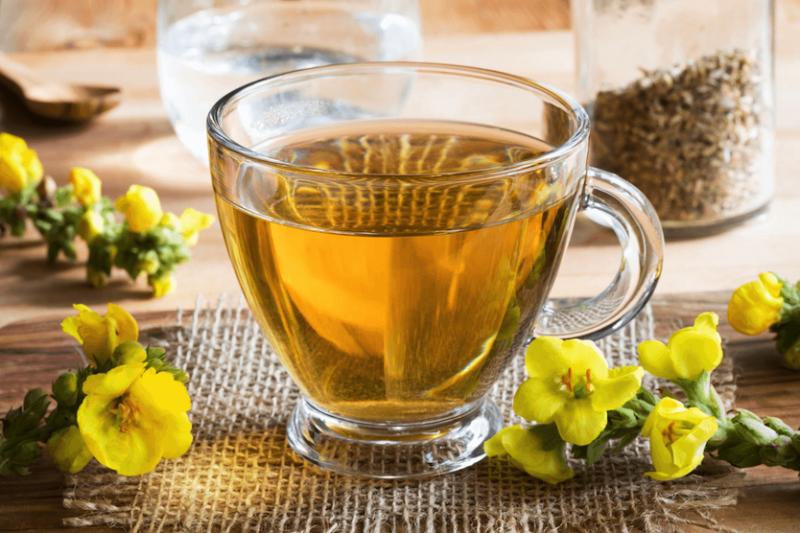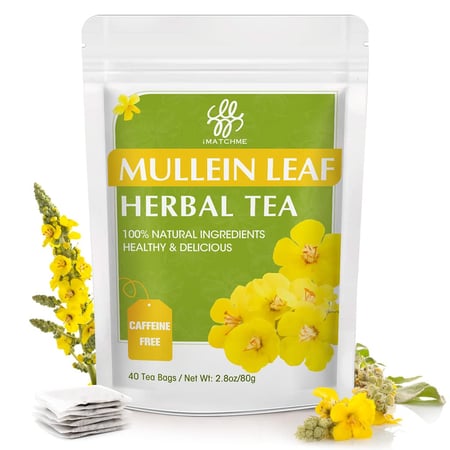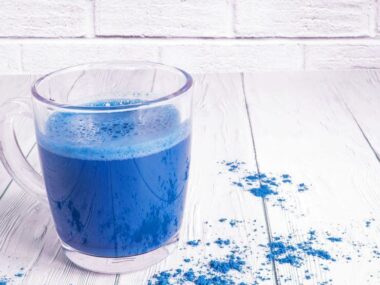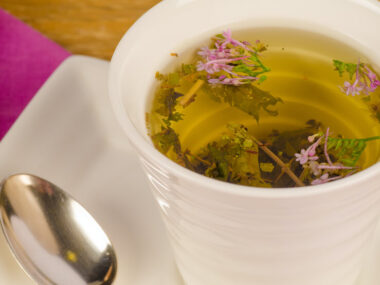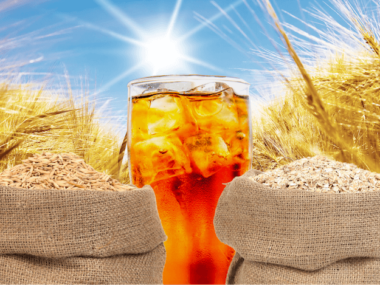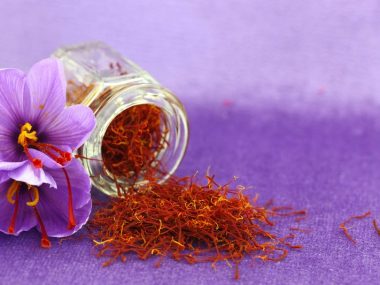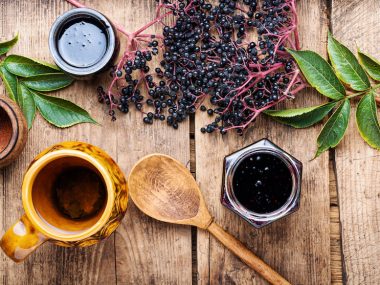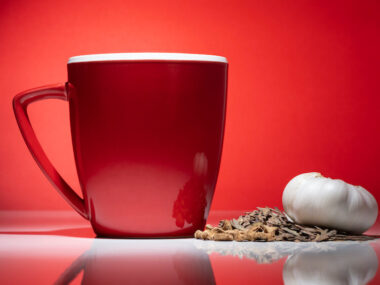Who knew that a cup of tea made from a fuzz-covered weed could pack a punch of benefits. Mullein plant is very common, and you have most likely mowed it down or passed one without giving it much thought. However, herbalists cultivate this weedy creature to brew mullein tea for a host of medicinal purposes!
Disclosure: We may earn commissions for purchases made through links in this post.
Table of Contents
What Is Mullein Tea?
Mullein tea is a tisane (not a true tea) made from the leaves and flowers from the Verbascum thapsus (common mullein.) Gardeners and herbalists grow this plant and harvest the flowers and leaves, which are dried and used to make tea and medicinal herbs.
History Of the Mullein Plant
The mullein plant is native to Europe and parts of Asia and Africa. However, it was introduced to the U.S. back in the 1700s in Virginia to “sting” or kill fish. The early settlers used crushed mullein seeds to add to small bodies of water as a means of collecting fish to eat.
Once the seeds were added to the water, fish began to cease breathing, making it easy to gather them. Mullein plants were cultivated back then for the sole purpose of collecting fish in an easy manner.
Another interesting thing about mullein seeds is their ability to survive most means of eradication. In Denmark, archeologists discovered viable mullein seeds in soil samples that date back to 1300 AD!
By 1818, mullein plants were widely established in the eastern portion of the U.S. and had rapidly grown, reaching the west coast in distribution by 1839. These weedy plants are found along the sides of roads, pastures, abandoned property lots, and areas where industries otherwise cause an inhospitable footprint.
Uses Of Mullein Plant
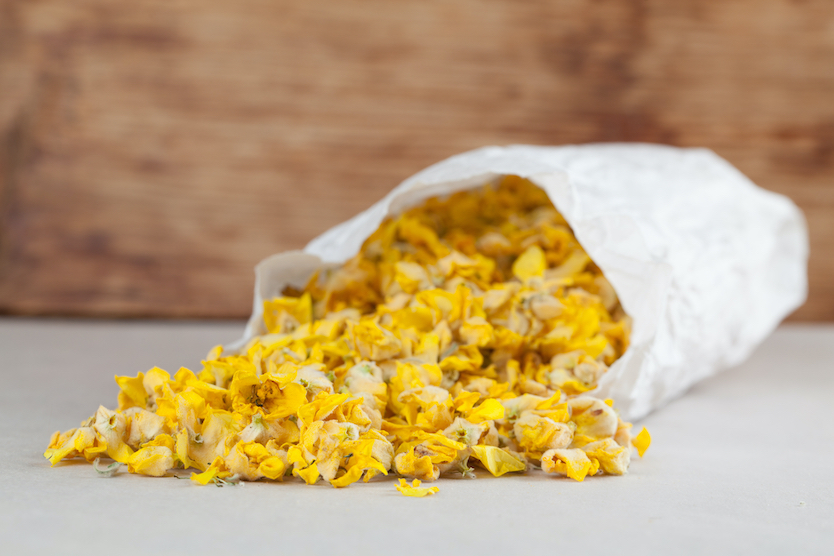
The many uses of this odd weedy plant are intriguing. Indigenous tribes here in America dried the leaves and flowers of the mullein plant and used it medicinally. By smoking it, respiratory ailments such as asthma or bronchitis were relieved. Some also made tinctures by boiling mullein leaves to stop coughing.
Folk medicine used the plant to treat tuberculosis, pneumonia, migraines, and many other ailments. Currently, traditional medicine uses an oil infused with mullein for earaches. Extracts, capsules, and teas made from this plant are gaining popularity for the many medicinal benefits.
What Does Mullein Tea Taste Like?
Many claim that mullein tea has a sweet flavor. However, a few dispute this claim by stating it’s bitter and unpleasant. The overall taste of mullein tea depends on whether your dried tea has been made from the leaves, roots, or flowers.
Some herbalists incorporate all of the plant into a tea mix, whereas others use the leaves only. The roots are distinctly bitter, whereas the leaves have more subtle earthy bitterness. The flowers have a hint of sweetness. To make the tea more palatable, a blend of another tea (typically green) and other herbs are incorporated into the tea mix.
Check this Mullein leaf tea on Amazon
How Mullein Leaf Tea Is Processed
Mullein tea isn’t something you can readily purchase through retail like other teas. It is sold by herbalists through Etsy and also very few herbal websites. How they cultivate and process mullein tea is unknown.
Is Mullein Tea Like Other Conventional Teas?
Mullein tea is a tisane and not a true (conventional) tea. Conventional teas are derived from the Camellia sinensis plant. Tisanes are what’s considered herbal teas, which are made from other plants. Tisanes do not have any caffeine as conventional teas do.
Can I Drink Mullein Tea Every Day?
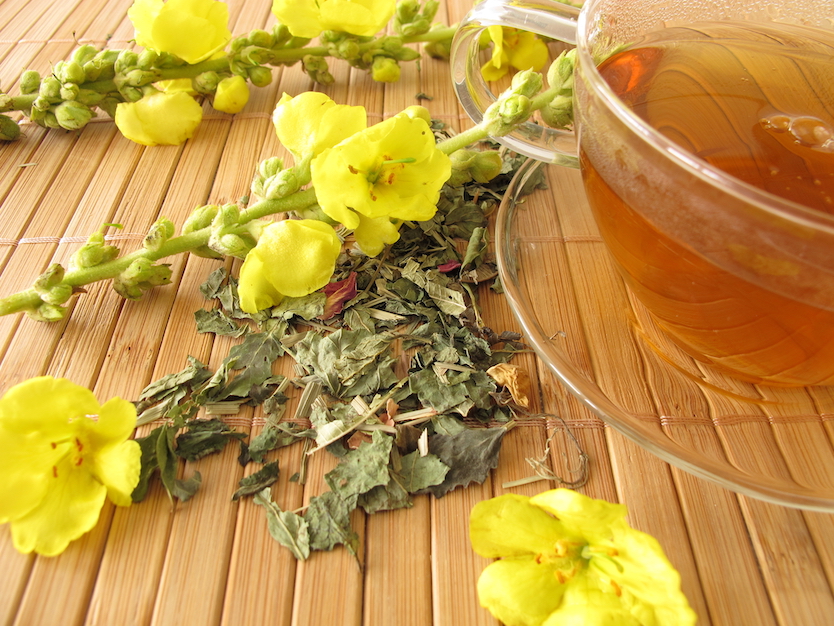
The European Medicines Agency Evaluation of Medicines for Human Use deemed mullein tea as “generally safe under normal conditions of use.” Furthermore, they go on to state that no harmful effects have been identified. However, they caution use in children (under 12 years) and pregnant/breastfeeding women.
The leaves of the mullein plant do contain coumarin (natural blood thinner) and rotenone (natural compound.) However, there are many claims (including the one above by the European Medicines Agency Evaluation of Medicines for Human Use) that drinking mullein tea is absolutely safe.
Still, contradictory scientific data from the National Library of Medicine, National Center for Biotechnology Information, states in their compound summary of rotenone that there are adverse effects. Their report notes that rotenone (found in the mullein plant) causes a disturbance in the nervous system and long-term toxicity to the respiratory, hematologic, and reproductive systems.
To drink, or not to drink, mullein tea daily basically comes down to making a personal choice.
What Are The Side Effects Of Mullein Tea?
As we mentioned above, conflicting reports state that mullein tea is safe yet comes with risks when consumed long-term. When a tea mix has the plant’s flowers incorporated, be careful to thoroughly strain the tea before drinking. The flower contains hairy particles that can become stuck in the back of the throat, causing irritation or increasing the chances of choking.
Seeds of the mullein plant that may have made their way into the tea mix may have a slight narcotic effect. These seeds (when combined with water) are used by fish poachers to stun/poison fish, making it easy to collect fish.
Does Mullein Tea Raise Blood Pressure?
There are no reports or studies that identify “hypertension” (high blood pressure) as a side effect of mullein tea. The mullein plant does, however, contain coumarin, which is a natural blood thinner. Coumarin is used in blood-thinning pharmaceuticals that treat (reduce high blood pressure.)
Is Mullein Tea Good For The Lungs?
Traditional medicine practices use mullein tea to relieve respiratory ailments such as bronchitis, asthma, tuberculosis, and cough. The use of mullein tea in conventional medicine has not been approved by the FDA as a treatment.
Mullein Tea Benefits
Mullein tea is said to have many medicinal benefits. Claims of drinking the tea not only help in relieving respiratory conditions but is also antiviral, antioxidant, antifungal, antibacterial, anti-inflammatory, and more.
Respiratory Ailment Relief
The mullein plant has been found to act as an expectorant and cough suppressant. The excess mucus that builds in the respiratory system as a result of disease, virus, or infection is said to be alleviated by drinking mullein tea.
Antibacterial
Mullein tea was found to have powerful antibacterial benefits by the Department of Pharmacy, University of Swabi, and the National Library of Medicine.
- Staphylococcus aureus
- Bacillus subtilis
- E-coli
- Pseudomonas aeruginosa
- Pneumonia
Antiviral
Researchers at the Department of Pharmacy, University of Swabi, and the European Medicines Agency Evaluation of Medicines for Human Use found that the mullein plant acts against viruses. Drinking mullein tea may reduce or serve as a defense against catching the flu (influenza A, influenza B,) avian flu, and herpes simplex type 1.
How To Make Mullein Tea: Brewing Method
We included a few recipes to make mullein tea with a twist. The additional ingredients help to curb any bitter taste.
Martha Stewart’s Mullein Tea Recipe
Ingredients
- 1 oz. mullein tea mix
- 2 ½ oz. peppermint
- 2 ½ oz. elderflowers
- 2 ½ oz. yarrow
- 1 oz. licorice
- 1 oz. Echinacea
- ½ oz. ginger
Mix The “Blends”
- Tea blend (keeps for one year): Combine mullein, yarrow, elder, and peppermint in a jar.
- Herbal blend (keeps for one year): Combine ginger, echinacea, and licorice in another jar.
Brewing Directions
(4-5 cup serving)
- Bring 4-5 cups of water to a boil. Reduce heat to low.
- Add 4 teaspoons of the herbal blend to water and simmer for 15-20 minutes.
- Remove from heat.
- Add 4 teaspoons of the tea blend, cover, and allow to steep for 15-20 minutes.
- Thoroughly strain and discard tea/herb blends.
- Use honey to sweeten (optional.)
- Enjoy hot or cold.
Berry Mullein Tea Recipe
Ingredients
- 2 teaspoons mullein tea
- 2 teaspoons raspberry tea leaves
- 3-4 cups of water
- ⅛ cup of fresh (chopped) raspberries and blueberries
- 1 teaspoon peppermint tea
- ½ teaspoon freshly ground ginger
Directions
- Thoroughly wash berries.
- Chop berries into small pieces.
- Combine berries and water and bring to a boil.
- Remove from heat.
- Add all ingredients, cover, and allow to steep for 10 minutes.
- Thoroughly strain and discard the tea mixture.
“Mulling” Over Mullein Tea
Mullein tea may be a powerhouse of benefits, but because it’s not a product available through retail, it kind of makes you go “hmmm.” In the herbal industry, the mullein plant plays a significant role in traditional medicine. However, more research is warranted to fully understand everything there is to know about mullein tea.
